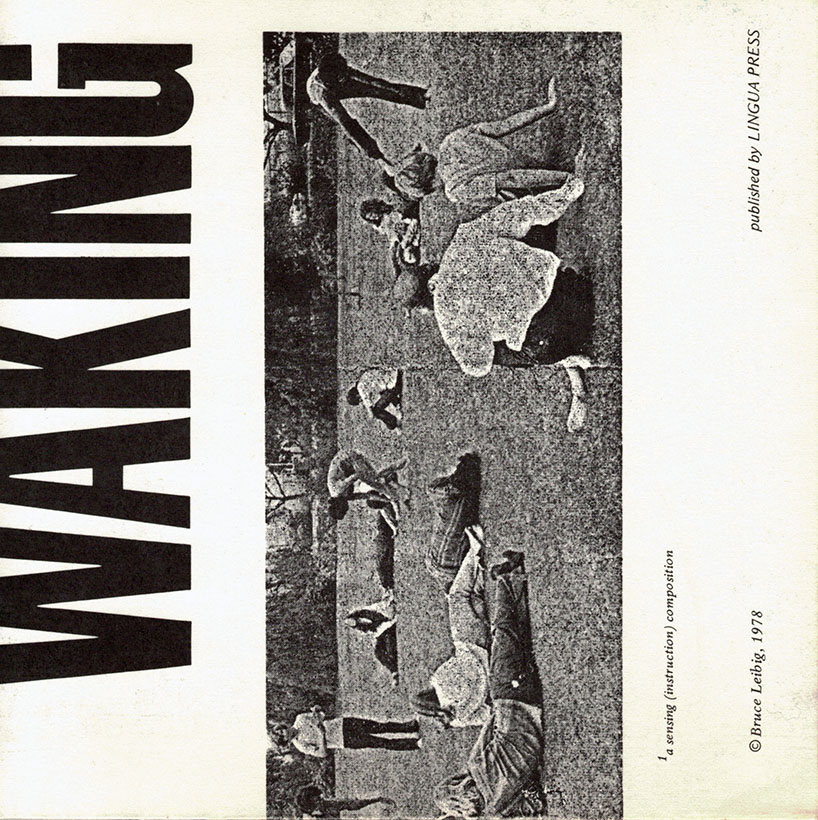Books
Books

Witches, Witch-Hunting and Women
The world is witnessing a new surge of interpersonal and institutional violence against women, including new witch hunts. This surge of violence has occurred alongside an expansion of capitalist social relation. In this new work, Silvia Federici examines the root causes of these developments and outlines the consequences for the women affected and their communities. She argues, that this new war on women, a mirror of witch hunts in 16th- and 17th-century Europe and the "New World," is a structural element of the new forms of capitalist accumulation. These processes are founded on the destruction of people's most basic means of reproduction. Like at the dawn of capitalism, the factors behind today's violence against women are processes of enclosure, land dispossession, and the remolding of women's reproductive activities and subjectivity.
Silvia Federici is a feminist writer, teacher, and militant. In 1972 she was co-founder of the International Feminist Collective that launched the campaign for Wages for Housework internationally. Her previous books include Caliban and the Witch and Revolution at Point Zero. She is a professor emerita at Hofstra University, where she was a social science professor.

When The Sick Rule The World
A writer takes on subjects as varied as vomit, Kathy Acker's wardrobe, and Occupy Oakland, in lyric explorations of illness, health, and the body.
A moving meld of essay, memoir, and story, When the Sick Rule the World collects Dodie Bellamy's new and recent lyric prose. Taking on topics as eclectic as vomit, Kathy Acker's wardrobe, and Occupy Oakland, Bellamy here examines illness, health, and the body—both the social body and the individual body—in essays that glitter with wit even at their darkest moments.
In a safe house in Marin County, strangers allergic to the poisons of the world gather for an evening's solace. In Oakland, protesters dance an ecstatic bacchanal over the cancerous body of the city-state they love and hate. In the elegiac memoir, "Phone Home," Bellamy meditates on her dying mother's last days via the improbable cipher of Steven Spielberg's E.T. the Extra-Terrestrial. Finally, Bellamy offers a piercing critique of the displacement and blight that have accompanied Twitter's move into her warehouse-district neighborhood, and the pitiless imperialism of tech consciousness.
A participant in the New Narrative movement and a powerful influence on younger writers, Bellamy views heteronormativity and capitalism as plagues, and celebrates the micro-revolts of those on the outskirts. In its deft blending of forms, When the Sick Rule the World resiliently and defiantly proclaims the "undeath of the author." In the realm of sickness, Bellamy asserts, subjectivity is not stable. "When the sick rule the world, mortality will be sexy," Bellamy prophesies. Those defined by society as sick may, in fact, be its saviors.

Undrowned: Black Feminist Lessons from Marine Mammals
Undrowned is a book-length meditation for social movements and our whole species based on the subversive and transformative guidance of marine mammals. Our aquatic cousins are queer, fierce, protective of each other, complex, shaped by conflict, and struggling to survive the extractive and militarized conditions our species has imposed on the ocean. Gumbs employs a brilliant mix of poetic sensibility and naturalist observation to show what they might teach us, producing not a specific agenda but an unfolding space for wondering and questioning. From the relationship between the endangered North Atlantic Right Whale and Gumbs's Shinnecock and enslaved ancestors to the ways echolocation changes our understandings of "vision" and visionary action, this is a masterful use of metaphor and natural models in the service of social justice.
With Foreword by Adrienne Maree Brown
Alexis Pauline Gumbs is a poet, independent scholar, and activist. She is the author of Spill: Scenes of Black Feminist Fugitivity, M Archive: After the End of the World, and Dub: Finding Ceremony; coeditor of Revolutionary Mothering: Love on the Front Lines; and the founder of Brilliance Remastered, an online network and series of retreats and online intensives serving community accountable intellectuals and artists.
Published Nov 2020

keeps crashing down the same
keeps crashing down the same period in my text between the paragraphs and i forgot about the crush is a book by Stine Sampers, 114 pages of her collected "predictive text songs" written between April 2018 and January 2019 in Brussels, Ghent, Antwerp, Alveringem, Amsterdam and Berrias-et-Casteljau with a Samsung Galaxy S5 (stolen in October 2018 in Brussels) and a Samsung Galaxy S7 (that had to be taught vocabulary). Cover image by Deveny Faruque, afterword by Maru Mushtrieva:
"Here, the longing for the Other – unsurmountable distance – is actualized not only by the content but also by the compositional design itself. What at first glance appears to be a stream of consciousness, is in fact a synthesis of vocabulary from past text messages. While composing them, Stine Sampers used her phone’s algorithm to decide what to say next, with suggestions coming from the text messages previously exchanged with her friends. The words from different contexts, once chosen carefully, now belong to the careless vocabulary of a machine, welcomed into a loop of misrecognition."
Published Nov 2020
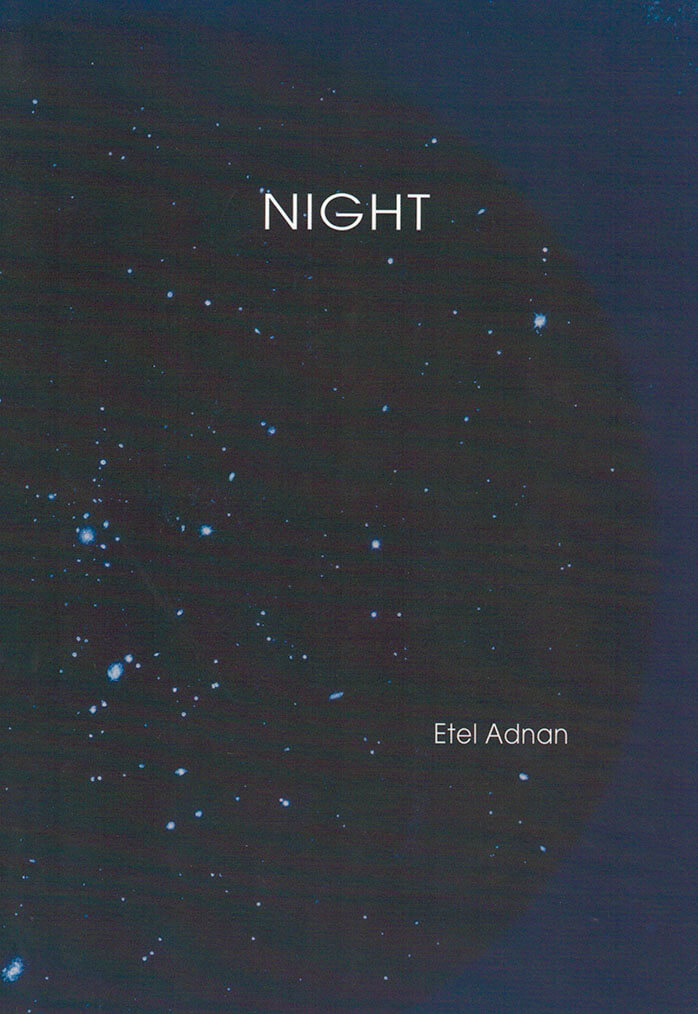
Night
Born in 1925 in Beirut, ETEL ADNAN has written more than a dozen books of poetry, fiction, and essays. A two-volume collection, To look at the sea is to become what one is: An Etel Adnan Reader, was published in 2014. She is a recipient of a PEN Oakland-Josephine Miles Award, the California Book Award, a Lambda Book Award, and a Chevalier des Arts et des Lettres. She lives in Paris and Sausalito, California.
"Trained in philosophy, Beirut-born author/activist Adnan blends a meditation on the meaning of memory with memories themselves, dredged up from a long life. And surely night, her setting here, is the time for such dredging. Adnan rigorously asserts that "reason and memory move together." But she argues that "a remembered event is a return to a mystery," and her writing is eye-openingly lush, gorgeous, even surreal ("waves of roses are blanketing memory"), showing us the mind at work on its unstructured, uncertain edges. The epigrammatic ending, "Conversations with my soul" ("Why are we lonelier when/ together"), will feed even those who don't typically read poetry. VERDICT A good way for sophisticated readers to recall why they first loved verse." — Library Journal
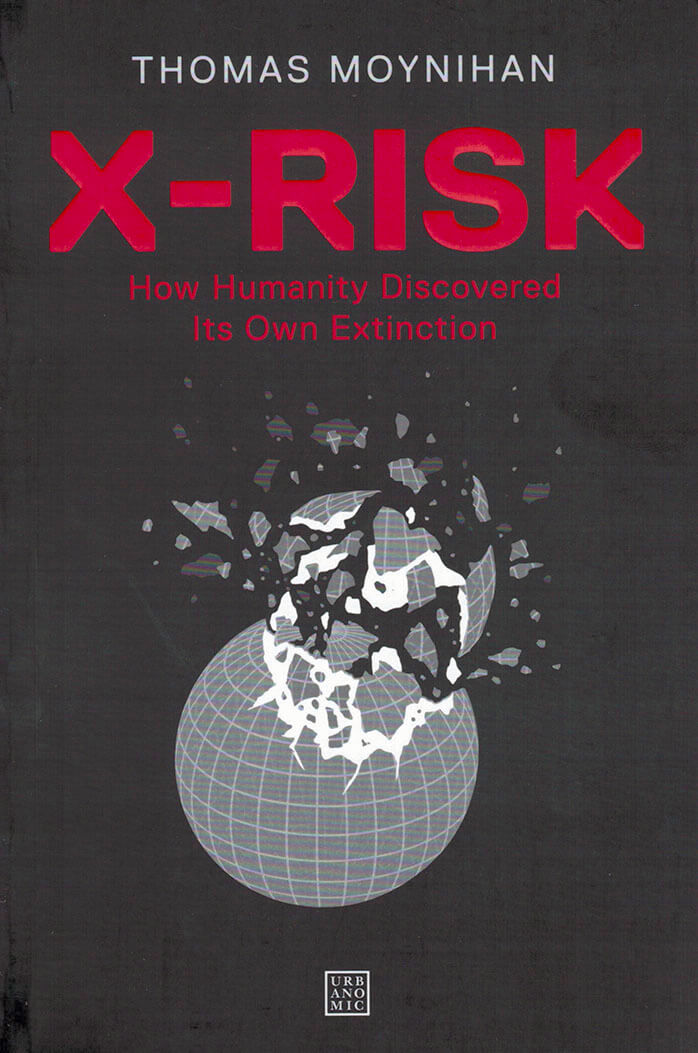
X-RISK
From forecasts of disastrous climate change to prophecies of evil AI superintelligences and the impending perils of genome editing, our species is increasingly concerned with the prospects of its own extinction. With humanity's future on this planet seeming more insecure by the day, in the twenty-first century, existential risk has become the object of a growing field of serious scientific inquiry. But, as Thomas Moynihan shows in X-Risk, this preoccupation is not exclusive to the post-atomic age of global warming and synthetic biology. Our growing concern with human extinction itself has a history.
Tracing this untold story, Moynihan revisits the pioneers who first contemplated the possibility of human extinction and stages the historical drama of this momentous discovery. He shows how, far from being a secular reprise of religious prophecies of apocalypse, existential risk is a thoroughly modern idea, made possible by the burgeoning sciences and philosophical tumult of the Enlightenment era. In recollecting how we first came to care for our extinction, Moynihan reveals how today's attempts to measure and mitigate existential threats are the continuation of a project initiated over two centuries ago, which concerns the very vocation of the human as a rational, responsible, and future-oriented being.

Outline of My Lover
The twentieth anniversary edition of an early autofiction classic.
Born in Virginia and raised in Georgia, Douglas A. Martin moved to New York at 25 and now resides in Brooklyn. Douglas's writing spans fiction and nonfiction, traversing poetry and prose. Martin's works have been translated into Italian, Japanese, and Portuguese. Past books include: Once You Go Back (Lambda Award nomination in the Gay Memoir/Biography category), Branwell (Ferro-Grumley Award finalist), a book of stories, and volumes of poetry. An early autofiction, Outline of My Lover, was named an International Book of the Year in The Times Literary Supplement and adapted in part by the Forsythe Company for their ballet and live film "Kammer/Kammer." Publications with Nightboat Books include a book-length essay and lyric study, Acker, and the triptych of novellas, Your Body Figured.
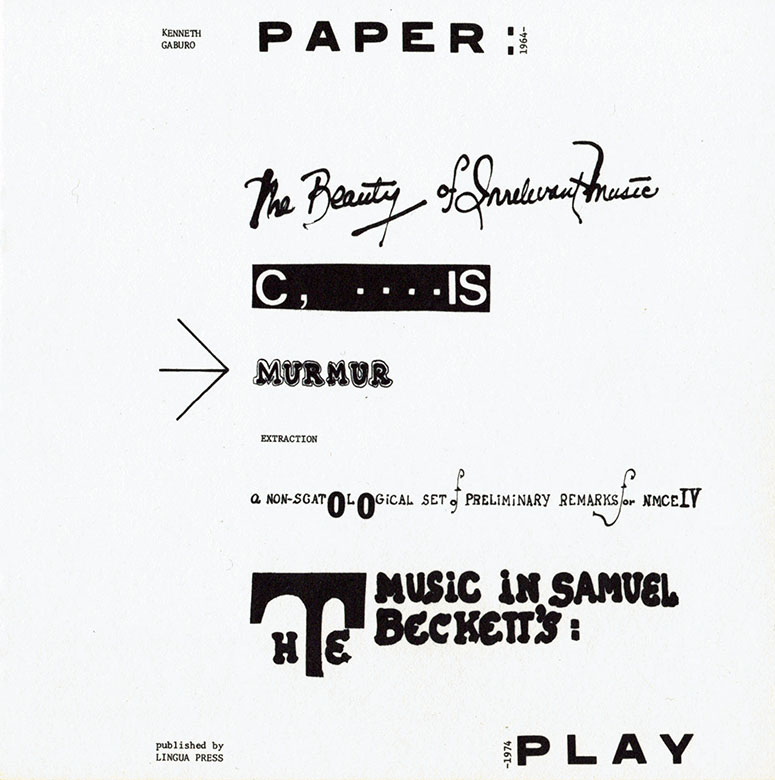
Murmur
Part of paperplay mini-book series. Limited edition.
Kenneth Gaburo (1926-1993) is renowned as a teacher, pioneer of electronics in music, jazz pianist, writer, ecologist, publisher, and proponent of compositional linguistics. Over the course of a dedicated career, his uncompromising work carved out its own patch in the territory of American experimentalism.

The Flight of the Sparrow: Lingua 1 Poems and Other Theaters
A composition for one actor and tape, or two actors. Score. 1970
![Cover of Dante's Joynte: Lingua 1. [Poems and Other Theaters]](https://rile.space/storage/744/dante.jpg)
Dante's Joynte: Lingua 1. [Poems and Other Theaters]
Kenneth Gaburo (1926-1993) is renowned as a teacher, pioneer of electronics in music, jazz pianist, writer, ecologist, publisher, and proponent of compositional linguistics. Over the course of a dedicated career, his uncompromising work carved out its own patch in the territory of American experimentalism.
Lingua Press, 1976

Privacy One : Words Without Song (1950-1974)
Kenneth Gaburo (1926-1993) is renowned as a teacher, pioneer of electronics in music, jazz pianist, writer, ecologist, publisher, and proponent of compositional linguistics. Over the course of a dedicated career, his uncompromising work carved out its own patch in the territory of American experimentalism.
Lingua Press, 1976

Something Medieval
James Kirtland Randall (1929 - ) was born in Cleveland, Ohio. He studied at the Cleveland Institute of Music from 1934 to 1947, and subsequently attended Columbia University (B.A., 1955), Harvard (M.A., 1956) and Princeton (M.F.A., 1958). He studied piano with Leonard Shure and composition with Herbert Elwell, Thad Jones, Roger Sessions and Milton Babbitt. From 1958 to 1991 he taught at Princeton, where he was professor of music. He was a founding member of the American Society of University Composers and has written articles on composing and music theory for several journals, notably Perspectives of New Music (some of these were collected in the monograph Compose Yourself: A Manual for the Young (Open Space, 1995)). He also collaborated with Benjamin Boretz on the book Being About Music: Textworks 1960-2003 (Open Space, 2003).
From the early 1960s into the 1970s, Randall engaged principally in computer synthesis of sound and, with Godfrey Winham, developed facilities for this at Princeton University. His tape compositions were generated by the MUSIC IV B program, a version of MUSIC IV introduced at Princeton. He designed his own software "instruments," which enabled him to specify every aspect of every sound and structure developments within single notes in ways that reflect principles of development used in whole compositions as, for example in Lyric Variations for Violin and Computer (1966-1968).
In 1980 he turned his attention to improvised musical performance and began a series of explorations of spontaneous group performance, or "real-time co-creation," involving many kinds of musicians and other artists (painters, dancers) as well. The ongoing efforts, preserved on hundreds of sound recordings and videotapes (under the project name Inter/Play), document the emergence of idiosyncratic group styles and performing conventions. Randall is himself a regular participant in these performances. In 1990, Randall, along with Elaine Barkin and Benjamin Boretz, started the publications series Open Space.
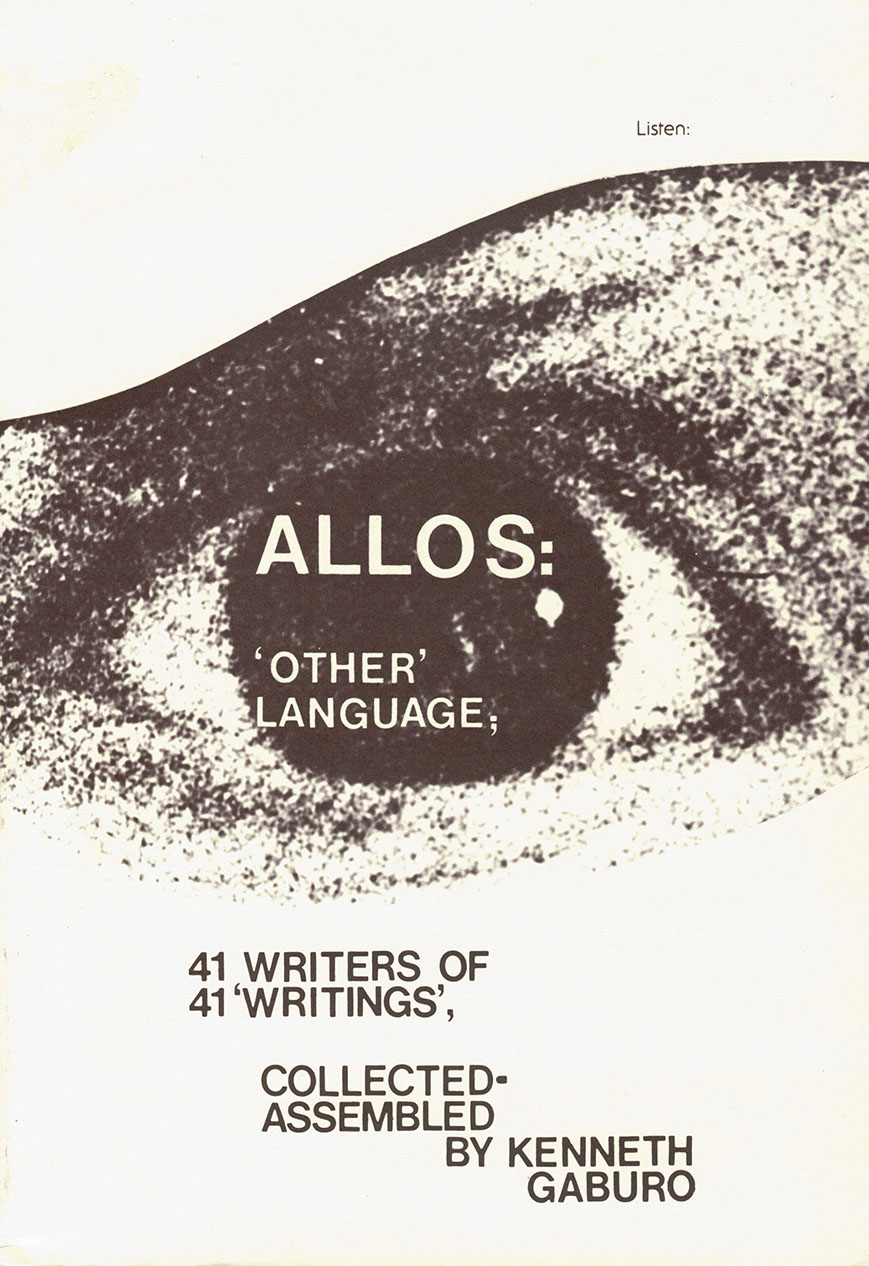
Allos : 'Other' Language
Gaburo collects and assembles 41 writers who explore such issues as aleatoric music, language, and poetry. Gaburo founded Lingua Press in 1975, taught at the University of Iowa, and is best known for his experimental musical compositions.

chris mann and grammar
A Lingua Press Bookplay, 1990
Introduction by Kenneth Gaburo,Herbert Brun, Annea Lockwood, David Dunn,John Cage.
Chris Mann (March 9, 1949 Australia–September 12, 2018 New York NY) was an Australian composer, poet and performer specializing in the emerging field of compositional linguistics, coined by Kenneth Gaburo and described by Mann as "the mechanism whereby you understand what I'm saying better than I do".[1] He was, in the last 2 decades of his life, based in New York City.
Mann studied Chinese and linguistics at the University of Melbourne, and his interest in language, systems, and philosophy is evident in his work. Mann founded the New Music Centre in 1972 and taught at the State College of Victoria in the mid-1970s. He then left teaching to work on research projects involving cultural ideas of information theory and has been recognized by UNESCO for his work in that field.[1]
Mann moved to New York in the 1980s and was an associate of American composers John Cage and Kenneth Gaburo. He performed text in collaboration with artists such as Thomas Buckner, David Dunn, Annea Lockwood, Larry Polansky, and Robert Rauschenberg.
Mann recorded with the ensemble Machine For Making Sense with Amanda Stewart, Rik Rue and others, Chris Mann and the Impediments (with two backup singers and Mann reading a text simultaneously while only being able to hear one another), and Chris Mann and The Use. His piece The Plato Songs, a collaboration with Holland Hopson and R. Luke DuBois, features realtime spectral analysis and parsing of the voice into multiple channels based on phonemes. Mann has also participated in the 60x60 project.[2]
Mann taught in the Media Studies Graduate program at The New School. He died in September 2018 after a recurrence of cancer. He is survived by his wife and two children.
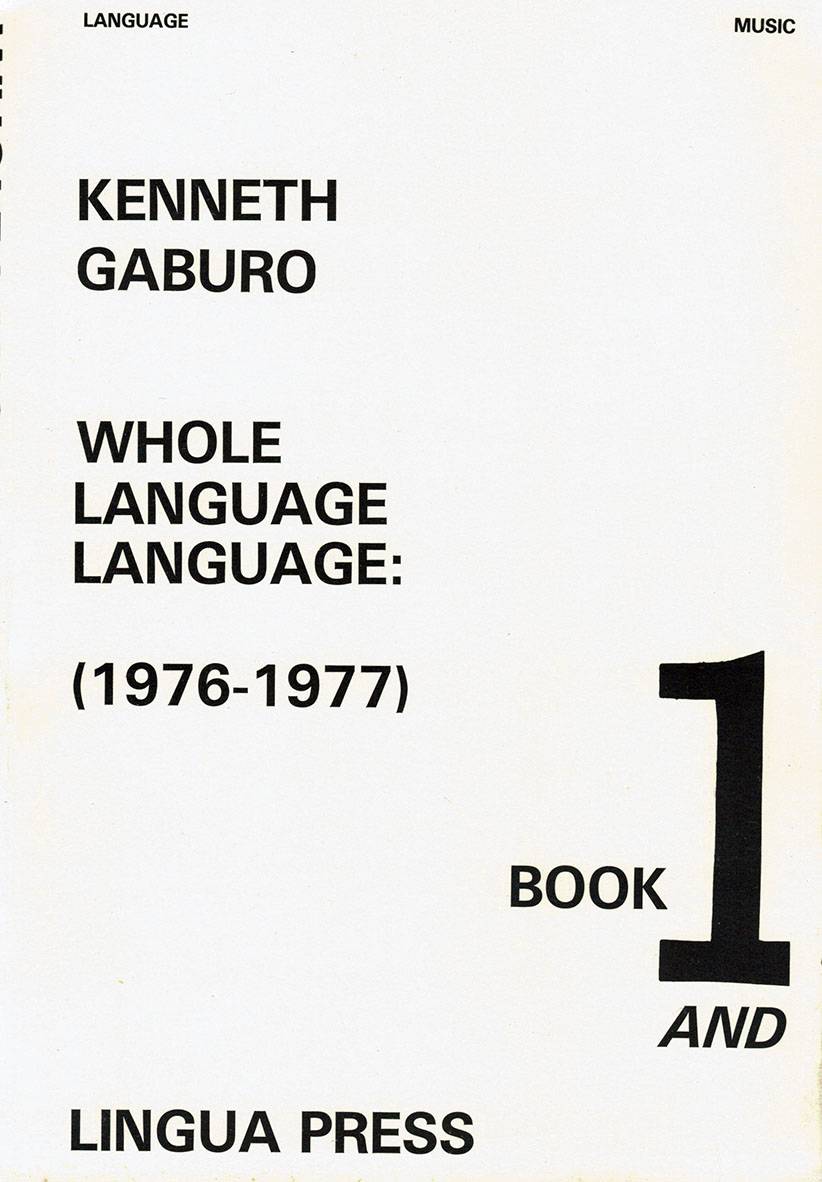
Whole Language Language : (1976-1977)
Lingua Press, 1988
Gaburo was born in Somerville, New Jersey. He served as a professor of music at the University of Illinois, the University of California, San Diego, and the University of Iowa. His notable students include James Tenney and Allen Strange. He is renowned as a teacher, pioneer of electronics in music, jazz pianist, writer, ecologist, publisher, and proponent of compositional linguistics.
In 1968, he joined the faculty at the new San Diego campus of the University of California where in 1972 a Rockefeller Foundation grant enabled him to start NMCE IV, this time with an actor, a virtuoso speaker, a mime, a gymnast, and a sound-movement artist (Rosen and Moore 2001). Until his resignation from UCSD in 1975 he produced a large number of integrated theatrical works, such as the collection Lingua and Privacy.
In 1975, Gaburo founded Lingua Press, which produces scores, books, records, audio tapes, videotapes, and films (Rosen and Moore 2001). This firm is dedicated to putting forth unique artist-produced works in all media having to do with language and music. Many of the publications have been exhibited in book art shows throughout the world. Gaburo lived in the Anzo-Borrego desert writing and teaching from 1980 until 1983. In 1980, he was artistic director for the first "authentic" production of Harry Partch's The Bewitched for the Berlin Festival (recorded on Enclosure Five: Harry Partch, innova 405). His understanding of Partch's concept of corporeality has deep connections with his own concern for physicality and how it informs compositions. His 1982 tape work, RE-RUN, for instance, was generated after a 20-hour sensory deprivation exercise.
He became Director of the Experimental Music Studio at the University of Iowa in 1983. The studio put intensive focus on composition, technology, psycho-acoustic perception, performance, and the affirmation of the uniqueness of the individual to create his/her own language reality. At the studio, he founded the Seminar for Cognitive Studies, a forum for discussion of the creative process. His concern for the investigation of music as legitimate research, and composition as the creation of intrinsic appropriate language, led to a series of readings in compositional linguistics for solo performer.
He most often made innovative use of electronics and explored tonality, serialism, and what he called "compositional linguistics" such as in his LINGUA series (Listening). He also wrote minimal pieces such as The Flow of (u) for three voices singing unison.
Gaburo died in 1993 in Iowa City, Iowa.
The archive of his life's work is held at the University of Illinois Music Library.

For Chris Mann (Open Space Magazine #22)
Dorota Czerner, Elaine Radoff Barkin
Special issue of this US magazine dedicated in its entirety to the late Australian artist/compositional linguist/raconteur Chris Mann, who died in 2018. The magazine contains tributes from Mann associates and admirers, including Warren Burt, Amanda Stewart, Pi-0, Ronald Robboy, Linda Kouvaras, Alvin Lucier, Ruark Lewis, Annea Lockwood, as well as Mann’s own writing and an interview with him by Philip Blackburn.
88 pages bound in soft-cover glossy colour cover by Brigid Burke.

Minerva - the Miscarriage of the Brain
Minerva the Miscarriage of the Brain collects a decade of work from artist, musician, and author of On Hell, Johanna Hedva. In plays, performances, an encyclopedia, essays, autohagiography, hypnagogic, and hypnapompic poems—in texts whose bodies drift and delight in form—Minerva tunnels into mysticism, madness, motherhood, and magic. Minerva gets dirty with the mess of gender and genius. She does the labor of sleep and dreams. She odysseys through Los Angeles, shapeshifting in stygian night and waking up to wail in the light.
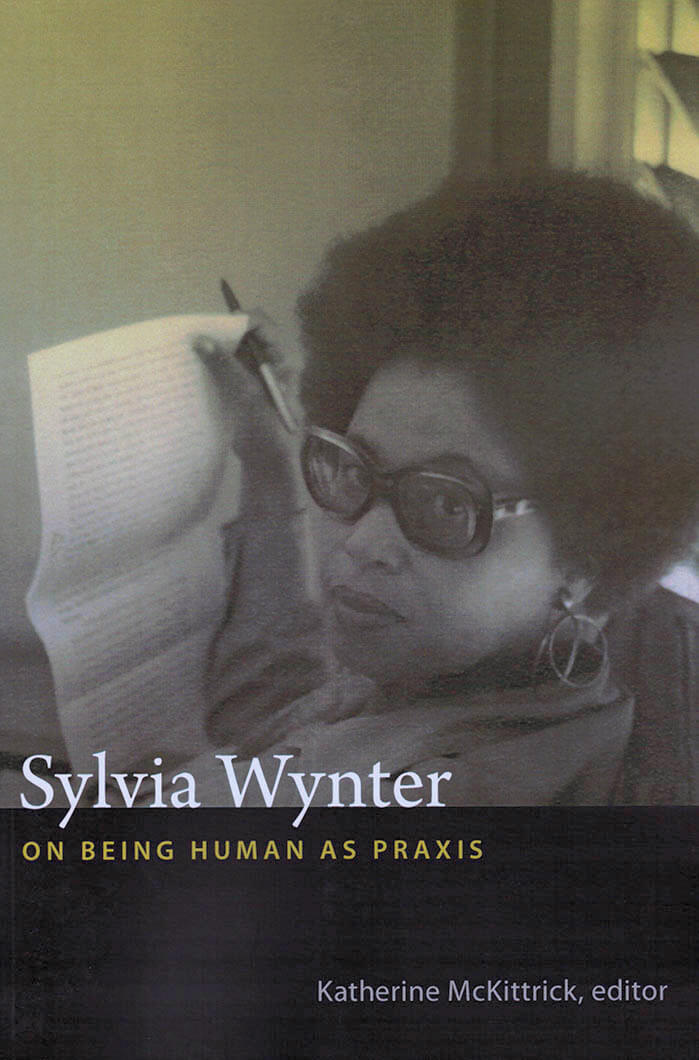
On Being Human as Praxis
The Jamaican writer and cultural theorist Sylvia Wynter is best known for her diverse writings that pull together insights from theories in history, literature, science, and black studies, to explore race, the legacy of colonialism, and representations of humanness.
Sylvia Wynter: On Being Human as Praxis is a critical genealogy of Wynter’s work, highlighting her insights on how race, location, and time together inform what it means to be human. The contributors explore Wynter’s stunning reconceptualization of the human in relation to concepts of blackness, modernity, urban space, the Caribbean, science studies, migratory politics, and the interconnectedness of creative and theoretical resistances.
The collection includes an extensive conversation between Sylvia Wynter and Katherine McKittrick that delineates Wynter’s engagement with writers such as Frantz Fanon, W. E. B. DuBois, and Aimé Césaire, among others; the interview also reveals the ever-extending range and power of Wynter’s intellectual project, and elucidates her attempts to rehistoricize humanness as praxis.

Habeas Viscus
Habeas Viscus focuses attention on the centrality of race to notions of the human. Alexander G. Weheliye develops a theory of "racializing assemblages," taking race as a set of sociopolitical processes that discipline humanity into full humans, not-quite-humans, and nonhumans. This disciplining, while not biological per se, frequently depends on anchoring political hierarchies in human flesh. The work of the black feminist scholars Hortense Spillers and Sylvia Wynter is vital to Weheliye's argument.
Particularly significant are their contributions to the intellectual project of black studies vis-à-vis racialization and the category of the human in western modernity. Wynter and Spillers configure black studies as an endeavor to disrupt the governing conception of humanity as synonymous with white, western man. Weheliye posits black feminist theories of modern humanity as useful correctives to the "bare life and biopolitics discourse" exemplified by the works of Giorgio Agamben and Michel Foucault, which, Weheliye contends, vastly underestimate the conceptual and political significance of race in constructions of the human. Habeas Viscus reveals the pressing need to make the insights of black studies and black feminism foundational to the study of modern humanity.
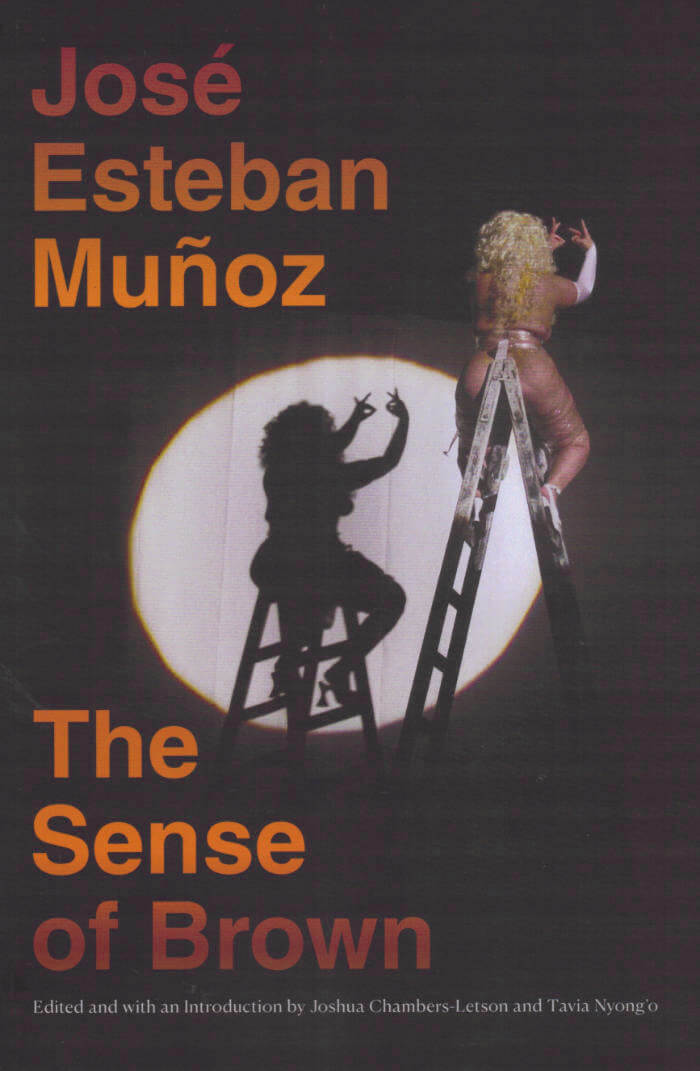
The Sense of Brown
The Sense of Brown is José Esteban Muñoz's treatise on brownness and being as well as his most direct address to queer Latinx studies. In this book, which he was completing at the time of his death, Muñoz examines the work of playwrights Ricardo Bracho and Nilo Cruz, artists Nao Bustamante, Isaac Julien, and Tania Bruguera, and singer José Feliciano, among others, arguing for a sense of brownness that is not fixed within the racial and national contours of Latinidad.
This sense of brown is not about the individualized brown subject; rather, it demonstrates that for brown peoples, being exists within what Muñoz calls the brown commons—a lifeworld, queer ecology, and form of collectivity. In analyzing minoritarian affect, ethnicity as a structure of feeling, and brown feelings as they emerge in, through, and beside art and performance, Muñoz illustrates how the sense of brown serves as the basis for other ways of knowing and being in the world.
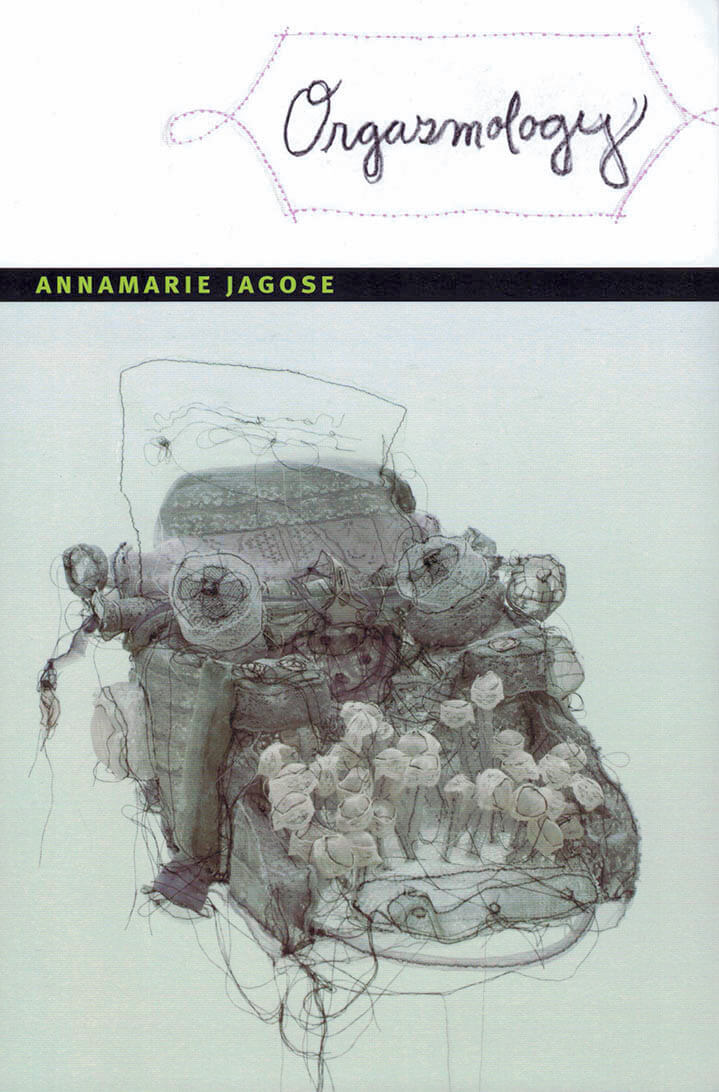
Orgasmology
For all its vaunted attention to sexuality, queer theory has had relatively little to say about sex, the material and psychic practices through which erotic gratification is sought. In Orgasmology, Annamarie Jagose takes orgasm as her queer scholarly object. From simultaneous to fake orgasms, from medical imaging to pornographic visualization, from impersonal sexual publics to domestic erotic intimacies, Jagose traces the career of orgasm across the twentieth century.
Along the way, she examines marriage manuals of the 1920s and 1930s, designed to teach heterosexual couples how to achieve simultaneous orgasms; provides a queer reading of behavioral modification practices of the 1960s and 1970s, aimed at transforming gay men into heterosexuals; and demonstrates how representations of orgasm have shaped ideas about sexuality and sexual identity.
A confident and often counterintuitive engagement with feminist and queer traditions of critical thought, Orgasmology affords fresh perspectives on not just sex, sexual orientation, and histories of sexuality, but also agency, ethics, intimacy, modernity, selfhood, and sociality. As modern subjects, we presume we already know everything there is to know about orgasm. This elegantly argued book suggests that orgasm still has plenty to teach us.

